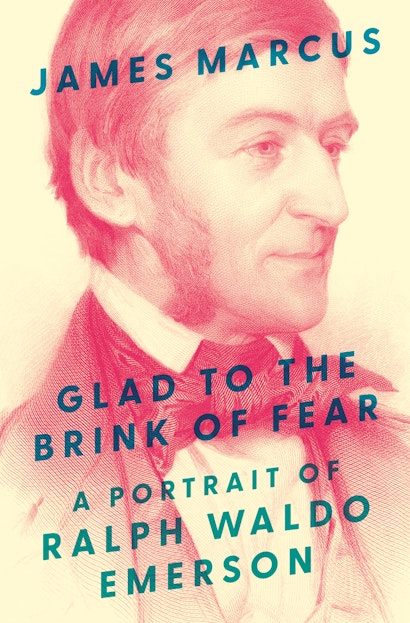Ralph Waldo Emerson has long been buried beneath the debris of his Victorian reputation, as the great apostle of positive thinking—the man who told you to hitch your wagon to a star. But in Glad to the Brink of Fear, James Marcus introduces us to a much more complicated figure. This Emerson is a visionary and a skeptic, an ardent lover and a fiery political activist. He is also a shrewd diagnostician of America itself, who speaks to our moment with tremendous relevance.
When did you first become interested in Ralph Waldo Emerson?
JM: Emerson came into my life at a very difficult moment. I was struggling with a demanding job, a chronically ill spouse, and a troubled child. I was quite lonely—and at night, after my wife and child were asleep, I found myself picking up an old paperback of Emerson’s essays. In some ways, this was a strange choice. Emerson does not write personal essays in our sense of that term. He does not offer bear hugs, nor any real evidence of his own struggles. Yet there was something in those essays that consoled me, and helped me to hang on. I now realize it was the ecstatic note—the sudden influx of feeling, perception, intelligence. Also, there was the sense that Emerson, despite his ornate and sometimes lofty prose, was always trying to tell the truth.
What makes Emerson an important figure in American culture?
JM: Emerson is everywhere, at least for Americans. His brilliant articulation of individualism is deep in the cultural bloodstream, probably forever. Of course there are some problems with self-reliance as holy writ—it has an atomizing and destructive effect on community. But Emerson is important in other ways, too. His insistence on a personal relationship with God has seeped into American religious practice. It’s odd to think that a buttoned-up Boston Unitarian born two centuries ago has such a profound (if subterranean) connection to contemporary evangelicals. Last but not least, Emerson is a very great American writer. Almost every other American writer of the nineteenth century was running towards him or away from him. He simply couldn’t be ignored.
Can you explain the meaning of your title?
JM: My title comes from Emerson’s first book and quasi-manifesto, Nature. In it, he recounts walking across the village common at twilight and experiencing a kind of ecstasy: “I am glad to the brink of fear.” What he is a describing is an intensity of feeling, an overwhelming joy and sense of connection, that is almost too much to be endured. Emerson loved this sensation—it was almost the point of living. Yet he argued that it couldn’t be turned on and off like a faucet. Instead it required an alertness to the world around you: a Zen-like attention to the details of existence. This kept Emerson anchored to the dailiness of life—the weather, the newspaper, the cup of coffee—even as he was determined to transcend it.
What was Emerson’s relationship to the great political issues of his day, and to slavery in particular?
JM: Like many a mystic, Emerson was initially leery of politics. He hoped for a revolution in consciousness, which would repair American life in one fell swoop rather than addressing its flaws in a piecemeal fashion. But the evil of slavery was what eventually drew him into political activism. By the mid-1840s, he had turned into a scorching abolitionist orator, whose speeches were reproduced in newspapers and in pamphlet form. He shared the platform with the likes of Frederick Douglass and William Lloyd Garrison, and may have even lobbied Abraham Lincoln to speed up emancipation when he met him in the nation’s capital in early 1862.
What does Emerson have to say to Americans in particular, and to readers in general, in 2024?
JM: Emerson foresaw so many aspects of modern American life. The steroidal growth, the rampant materialism, the love of speed and sheer size—none of that would have surprised him at all. Even the Internet might strike him as merely the mechanical equivalent of the Over-Soul. But I think he would be thrown by the viral quality of public opinion, the constant sense of one hive mind jousting with another. Emerson would insist that Americans think for themselves—that we resist the steamrolling power of the herd. At the same time, he despised ideological rigidity. Our duty, he would argue, is to constantly reexamine our cherished assumptions. We must change our minds. This is not evidence of fickleness or frivolity. It is proof that you are alive and engaged with the universe.
James Marcus is the author of Amazonia: Five Years at the Epicenter of the Dot.Com Juggernaut. He edited and introduced Second Read: Writers Look Back at Classic Works of Reportage and has translated seven books from the Italian, the most recent being Giacomo Casanova’s The Duel. He is also the former editor of Harper’s Magazine, and currently teaches at NYU’s Arthur L. Carter Journalism Institute. He lives in New York City. Twitter @jamesamarcus

